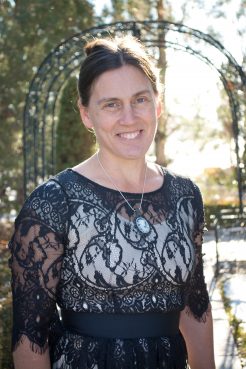
Mette Harrison. Courtesy photo
A guest post by Mette Ivie Harrison
I grew up as one of those LDS kids who wanted a dozen children (my mom had eleven). I still find myself singing the old Primary song, “when I grow up, I want to be a mother, and have a family.”
Back then even more than today, little girls were taught that they weren’t going to have careers and get jobs. They were going to be mothers. That was their God-given right: to stay home and raise their children. And after that, to remain mothers in other ways by helping with other people’s children, or with their grandchildren.
One of the first hymns I learned to play on the piano was “O My Father” (ah, the irony that the one song that talks about Heavenly Mother is titled this). I liked the idea of a Heavenly Mother, but was frustrated that she was so silent and powerless. When I became a mother and a writer and believed that I had a calling to help change the world for the better, I was hungry for female role models in the Church of Jesus Christ of Latter-day Saints. I kept seeking out women who had purpose, especially ones who had raised children and then found something to do that would change the world. They existed, but many of them were on the fringes of the church.
It seemed to me that once their children were raised, mostly the church expected women to kind of fade into the framework. Go on missions—which were usually following your husband around. Raise grandchildren. Do charitable work. The end. Women’s lives after childbearing and childrearing just didn’t seem to interest the men of the church anymore. Why couldn’t the women find things to do and not distract the men from their important work? There’s always quilting and knitting and cooking, isn’t there?
But I was in my twenties and thirties and wasn’t at that stage yet. I was still in the midst of raising five children and for two decades, I took the church at its word when it said that my most important role was motherhood. I learned from my children every day how to be a better mother. I listened to them, tried to be nimble as a parent and figure out how each child needed different parenting strategies in order to thrive. My oldest daughter burst into tears if there was the least bit of scolding in my voice, but my second just laughed at that tactic. I had to learn what felt to me a completely different (and unfair) strategy to manage her. Each child who came along needed new things from me—some needed more time, others more money. Some needed more of each.
But I gave and I gave. I spent my soul on raising my children and on trying to help other people’s children in my callings in Primary and nursery in the church.
Until one day, something happened. Or maybe it wasn’t really one single day that it happened, but one day I realized it had been happening for a while: I discovered that I couldn’t stay in the church and at the same time keep my promise to my children to be their mother first and foremost. I couldn’t honor the God-given commandment to put their needs ahead of my own—and also stay within Mormonism. As my children stepped away from the church, they needed me to see them, to honor them, to protect them, and to stand up for them in many different ways. I saw the direct conflict with remaining in Mormonism and listening to my children. (Please don’t read this and think that I believe every Mormon mother needs to leave the church to protect her child—I know many strong women who are working hard to make space for their children in the church and I honor them for doing this. But it wasn’t what I felt God was calling me to do.)
Now I inhabit a strange contradiction. I still believe that most Mormon of doctrines for women: that being a mother is my most important role. It is a responsibility so sacred that I can never give it up. Not even for the church itself. When it felt to me like the church demanded I make a choice between my children and its teachings about worthiness depending on checklists and following a very narrow path of heterosexual marriage, I chose my children. When I saw that the church’s perfectionist teachings were directly harming my children to the point that Sundays became a dangerous mental health day at our house, I began to encourage them to consider not attending anymore—and giving up any hurtful aspects of Mormonism.
I joined the official Mama Dragons group, though this is not an official statement for them (I’m just one member of many—not in the leadership). Mormonism made me an advocate and protector of my own children and other children who are often neglected, ridiculed, dismissed, or criticized because of who they are most deeply, most spiritually.
I don’t regret what the church turned me into, not for a moment. I’m proud of it. But it is sad that the church doesn’t seem to see the contradiction that leads so many fiercely protective and loving mothers away from the church that taught them to become such devoted mothers in the first place.
We love our kids. We love them too much to stay.
Also by Mette Harrison:
Mormon pioneer grit helped prepare me for this pandemic
Even if I’m not a believing Mormon anymore, family will be forever





